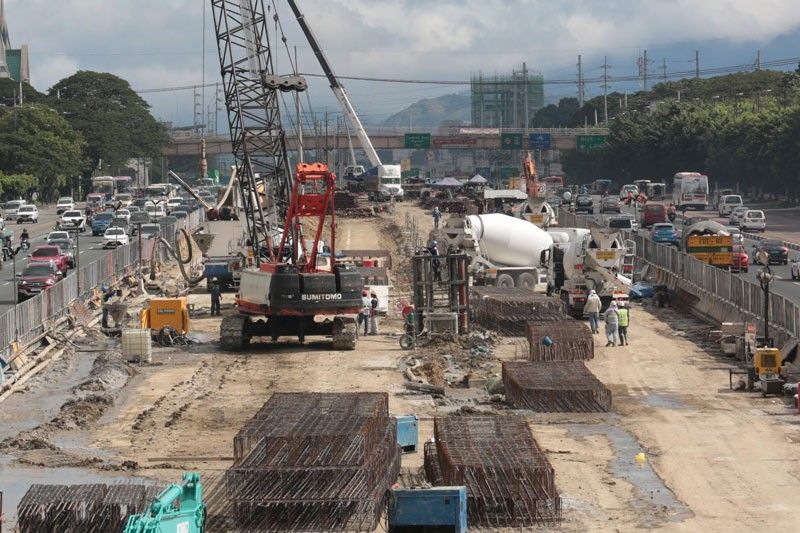Commentary: The long, winding road towards infra dev’t

The World Economic Forum released Thursday its annual Global Competitiveness Index for 2018. In the report, the Philippine economy ranked 56th out of 140 countries and fifth in Southeast Asia, trailing behind Singapore (2nd), Malaysia (25th), Thailand (38th) and Indonesia (45th).
The report evaluated 12 pillars, namely: institutions, infrastructure, information and communication technology adoption, macroeconomic stability, health, education and skills, product market, labor market, financial system, market size, business dynamism and innovation capability.
The Philippines is among the top forty performers in market size (32nd), labor market (36th), financial system (39th), and business dynamism (39th). However, the country’s efficiency proved to be lackluster in certain aspects as reflected in the ranking of its institutions (101st), health (101st) and infrastructure (92nd).
While the 92nd ranking in infrastructure technically represents a five-spot climb from last year’s 97th, the Philippines remains to be in the bottom-third of the ranking and is therefore no reason to celebrate.
Poor infrastructure quality of the Philippines remains to be the weak link in boosting our overall business climate. The same report identified as among the country’s downfalls road connectivity (129th), followed by exposure to unsafe drinking water (101st), efficiency of train services (100th), and electrification rate (100th).
Given this infrastructure gap, one of the reforms planned by the Duterte administration in the context of its “Build, Build, Build” agenda is a more open environment for unsolicited proposals.
As opposed to the standard solicited process in which a government agency, through a public sector comparator, solicits competitive proposals from the private sector to undertake a project, the unsolicited process highlights the role of the private sector in its submission of proposals on its own initiative. These proposals can be considered as sources of innovative ideas, effectively utilizing the strengths of the private sector.
In view of this policy direction, unsolicited proposals have been gaining traction and momentum in the country. Among the popular ones are the Bulacan airport, the Guadalupe- BGC Skytrain, a toll road linking Sta. Mesa to the Mall of Asia Complex (C3X), the redevelopment and upgrading of the Ninoy Aquino International Airport Terminal, the operation and maintenance of Metro Rail Transit Line 3, the development of Davao International Airport, and the operation and maintenance of Kalibo International Airport, Iloilo International Airport, Bacolod-Silay Airport, Laguindingan Airport, and New Bohol International Airport in Panglao.
A few days ago, the Department of Transportation acted upon an unsolicited proposal for the development of a monorail in Davao City and granted Udenna Corp. an original proponent status for the project. The proposal is currently with the National Economic and Development Authority for review.
As the private sector assumes a greater role in this sphere, the government has the burden of ensuring transparency, accountability, and competition in the delivery of infrastructure projects.
This challenge was discussed last October 15 at the roundtable discussion on unsolicited proposals hosted by Stratbase ADR Institute with the Public-Private Partnership (PPP) Center.
The PPP Center, for its part, discussed the proposed reforms in order to address the gaps in the existing unsolicited proposal framework. Among these are provisions addressing the lack of flexibility in accepting unsolicited proposals by the implementing agencies. One of the qualifiers for submission of an unsolicited proposal is that it must not be part of the infrastructure priority list.
The proposed act attempts to relax such rule toward welcoming unsolicited bids without discrimination of priority status of projects. This will also amend the current legal framework and allow unsolicited proposals to be converted into solicited bids, subject to reasonable compensation to the proponent.
Also included is a provision granting the extension of the current time-period for the Swiss challenge from 60 days to at least six months, in an effort to grant fair leeway to other interested parties for a counter-proposal.
In the discussion, Dr. Epictetus Patalinghug, Professor Emeritus of the University of the Philippines and Trustee of Stratbase ADR Institute, suggested an alternative approach. By separating the proposal stage from the award stage, the government will be able to do away with the disadvantages of unsolicited proposals, such as lack of transparency and competition.
PPP deals are not always better than public provision, he said, but incentives are more powerful under a PPP arrangement and long-term contracts can improve maintenance of projects, which is one of the main shortcomings of traditional public provision.
Romulo Neri, former Secretary of Socio-Economic Planning and NEDA Director General, suggested that for future projects, the government must release a general concept of infrastructure development in which “everybody can come up with their best proposal,” instead of leaving the private sector in the dark and in a perpetual guessing game.
The road in ensuring quality infrastructure may be long and winding, but it is a path that we must take as it leads to growth and development. Cruising this road means working toward inclusive growth by prioritizing key investments and improving the overall business climate by lessening regulatory complexities and encouraging private sector participation, which ultimately complements the role of the public sector.
Atty. Hannah Viola is the Energy and Infrastructure Fellow at Stratbase ADR Institute and a convenor and legal counsel at CitizenWatch Philippines.
- Latest


























